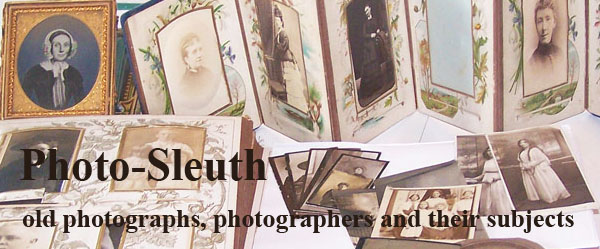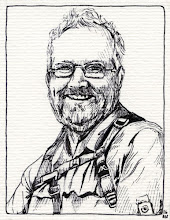
The photographer does not appear to have been particularly skilled, as little care was taken with the group's arrangement, and the bright whites of the maids' pinnies have resulted in a rather washed out appearance in the photo. The second photo of the pair is rather more interesting, as each of the young women, seated in a slightly different order, now carries the various tools of their trade.

They are, from left to right, a pestle and mortar,

... a watering can,

... a cooking pot,

... a salver, possibly with a note on,

... sewing,

... and another watering can.

These serve to illustrate a range of household duties, from growing vegetables in the kitchen garden to preparing and cooking food, running errands for the master and madam around the house, and mending clothes. There appears to be only slight variation in the uniforms worn, and this may have more to do with their age than their individual duties. The girl in the centre holding a pot, who appears to be younger than the others, has a light coloured dress, while the others' dresses are all dark.

The stamp on the reverse of the cabinet card, shown above, identifies the photographer as Samuel Whitbread of West Street in Havant, a small town in Hampshire, not far from Portsmouth. Although originally a baker, Whitbread turned his hand to photography in the late 1880s. The family lived in West Street, but moved to 20 South street prior to April 1891, suggesting a latest date for this sitting of early 1891.
The sleeves of the womens' dresses are also appropriate for between 1889 and 1891, with the first appearance of the fashionable puffed sleeves so characteristic of the 1890s being worn by the younger women,

... while the older woman, seated at front left in the lower photo, has the rounded-shoulder sleeves more fashionable in the 1880s.

If it was taken c. 1890-1891, this was possibly taken during the early part of Whitbread's photographic career, which would explain the amateurish poses and exposure. He remained in business for at least another decade, so presumably he did get better at his job.
The chances of identifying any of the female servants in the photo, or the location at which it was taken, are slim. However, it may be worth noting that the 1891 Census shows one of Whitbread's daughters - Laura Alice, aged 19 - working as a cook, presumably for a wealthy resident in the town of Havant, and it is remotely possible that she is one of those pictured.








Just wanted to say that your blog is excellent for costume research!!
ReplyDeleteThanks very much Christine for dropping by and leaving a note. It's always good to hear from those who've found the articles and images of some use.
ReplyDeleteRegards and best wishes, Brett
Great pictures, but those are hot water cans not watering cans! Hot water was carried to bedrooms for washing, shaving etc in such cans by servants.
ReplyDeleteThanks, Nemesis, for your excellent observation and correction. That makes perfect sense.
ReplyDeleteRegards, Brett